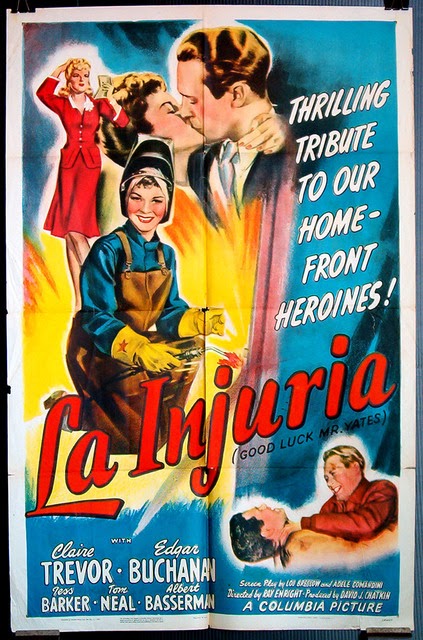Our film for this week is a wartime B picture entitled Good Luck, Mr. Yates (1943), It stars Jess Barker as the titular Oliver Yates, an instructor in a Carlyle Military Academyl who has been, much to his disgust, exempted from military service as an essential employee (why a grade school teacher would be exempt from the draft is beyond me). Many of his students are hostile because he is not in the war, and Oliver is finally able to convince his boss that he must enlist. Only problem is, he has a perforated eardrum and is listed as 4F. Rather than return to the school, he gets a job at a shipbuilding facility, while he seeks treatment from German refugee Dr. Carl Hesser (Albert Basserman). Dr. Hesser can cure him in a few weeks, and he'll be able to join the army. Right...
To be upfront, two of our viewers found the film amusing, two of us loathed it (and I was one of the loathers). The film is all over the place, with no real focus, and much of it doesn't make a whole lot of sense. With a panoply of European characters (our German doctor, the Greek landlord, the Russian dockyard workers), all there to remind us of what we are fighting for, it tries to demonstrate the wonderful melting pot that is the United States. But all it succeeds in showing is that a mob is nasty no matter where you live.
And then there is our local "Rosie the Riveter", Claire Trevor as Ruth Jones, daugher of Oliver's shipyard boss, "Jonesy" Jones (Edgar Buchanan playing the only really good man in this movie). How Ms. Trevor got mixed up in this turkey is beyond our ken. She is such a good actress, and her success in Stagecoach is only a few years in the past. Around this period, she was appearing in a number of film noir like Crossroads and Murder My Sweet, frequently not in a starring role. Still, playing second fiddle to Jess Barker must have been a come down.
Jess Barker is banal as Oliver Yates, though one has to admit, he's not given a whole lot to work with. He's an attractive enough man, reminiscent of Richard Denning. But Barker had an abbreviated career, thanks to his own bad judgement. He was married to Susan Hayward for 10 years, and when she asked for a divorce, Barker created quite the public row. He insisted on a community property settlement (despite having signed a pre-nuptual agreement). When he was refused money, he filed for full custody of the twin sons. He lost that too. Then, two years later, he was implicated in a paternity suit, and was ordered to pay support for his daughter (conceived, it turned out, while he was still married to Hayward). He continued to act until 1977, but his reign as a potential leading man was long over.
Another interesting aspect of this film is the marketing - it is (as you can see from the poster above), touted as a "thrilling tribute to our home-front heroines," with Claire Trevor getting top billing. Yet, there is very little about Ruth's war efforts. For better or worse, this IS Yates story.
We have an appearance by Scotty Beckett as student Jimmy Dixon, and brief, uncredited appearances by Hugh Beaumont and John Hamilton. What we DON'T have are two segments that were cut from the film. Nan Wynn was supposed to sing as part of a lunchtime entertainment scene for the shipyard worker, but that was eliminated (here is a video of Ms. Wynn singing in Princess O'Rourke). Also cut were the Three Stooges doing their "Niagara Falls" routine. It seems the studio heads decided to save the routine and give it its own film: Gents Without Cents. Quite honestly, we considered THAT cut to be the one good thing about the film.
Next week, it back to the 1930s for a musical romance. Hopefully, we'll have more positive things to say!
Another interesting aspect of this film is the marketing - it is (as you can see from the poster above), touted as a "thrilling tribute to our home-front heroines," with Claire Trevor getting top billing. Yet, there is very little about Ruth's war efforts. For better or worse, this IS Yates story.
We have an appearance by Scotty Beckett as student Jimmy Dixon, and brief, uncredited appearances by Hugh Beaumont and John Hamilton. What we DON'T have are two segments that were cut from the film. Nan Wynn was supposed to sing as part of a lunchtime entertainment scene for the shipyard worker, but that was eliminated (here is a video of Ms. Wynn singing in Princess O'Rourke). Also cut were the Three Stooges doing their "Niagara Falls" routine. It seems the studio heads decided to save the routine and give it its own film: Gents Without Cents. Quite honestly, we considered THAT cut to be the one good thing about the film.
Next week, it back to the 1930s for a musical romance. Hopefully, we'll have more positive things to say!


FLjQ~~0_35.JPG)
No comments:
Post a Comment
Thanks for your interest in this blog. Your comments will be moderated to minimize spam to the website. Thanks for understanding.